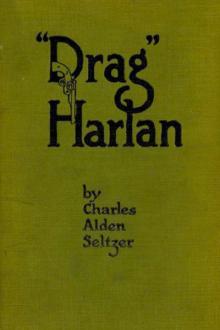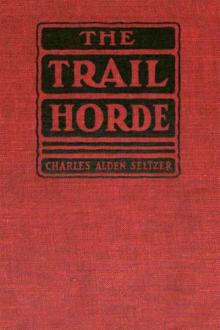'Drag' Harlan, Charles Alden Seltzer [ebook reader computer TXT] 📗

- Author: Charles Alden Seltzer
- Performer: -
Book online «'Drag' Harlan, Charles Alden Seltzer [ebook reader computer TXT] 📗». Author Charles Alden Seltzer
Deveny was a fast man with the big Colt that swung at his hip, a deadly marksman, and he needed but little provocation to exhibit his skill. For that reason his men kept the distance Deveny had established between them—never attempting familiarity with him.
Deveny had heard from a Star man the story of Harlan’s coming to the Star and when a day or so later Haydon rode into the Cache, Deveny was in a state of furious resentment.
There had been harsh words between Haydon and Deveny; the men of the Cache had no difficulty in comprehending that Deveny’s rage was bitter.
Not even when Haydon told him that his acceptance of Harlan had been forced by circumstances, and that he was tricking Harlan into a state of fancied security in which he could the more easily bring confusion upon him did Deveny agree.
“You’re a damned fool, Haydon!” he told the other, his face black with passion. “That guy is slick as greased lightning—and faster. And he don’t mean any good to the camp. He’s out for himself.”
Deveny did not intimate that his dislike of Harlan had been caused by the latter’s interference with his plans the day he had held Barbara Morgan a prisoner in the room above the Eating-House in Lamo; but Haydon, who had heard the details of the affair from one of his men, smiled knowingly.
It was not Haydon’s plan to let Deveny know he knew of the affair, or that he cared about it if he had heard. And so he did not mention it.
But in his heart was a rage that made his thoughts venomous; though he concealed his emotions behind the bland, smooth smile of good-natured tolerance.
“I’ll handle him, Deveny,” he said as he took leave of the other. “He’ll get his when he isn’t expecting it.”
Deveny, however, had no faith in Haydon’s ability to “handle” Harlan. He had seen in the man’s eyes that day in Lamo something that had troubled him—an indomitability that seemed to indicate that the man would do whatever he set out to do.
But Deveny did not ride to the Star to see Harlan; he was reluctant to stir outside the Cache, and for many days, while Harlan was attaining supremacy at the Star, and while Haydon was absent on a mysterious mission, Deveny kept close to the Cache, nursing his resentment against Haydon, and deepening—with fancied situations—his hatred for Harlan.
It did not surprise Deveny when a Star man rode into the Cache one day and told him that Harlan had killed Latimer in a gunfight, and that Harlan was slowly but surely gaining a following among the men. The information did not surprise Deveny; but it sent his mind into a chaos of conjecture and speculation, out of which at last a conviction came—that Harlan was seeking control of the outlaw band; that Haydon’s days as a leader were almost over, so far as he was concerned. For if Haydon insisted on taking Harlan into the secret councils of the camp he—Deveny—was going to operate independently.
The more his thoughts dwelt upon that feature the more attractive it seemed to him. Independence of Haydon meant that he could do as he pleased without the necessity of consulting anybody. He could rustle whatever cattle he wanted—getting them where he could without following Haydon’s plans—which had always seemed rather nonsensical, embracing as they did the scheme of railroad building and town sites; and he could do as he pleased with Barbara Morgan, not having to consider Haydon at all.
It was that last consideration that finally decided Deveny. He was an outlaw—not a politician; he robbed for gain, and not for the doubtful benefits that might be got out of the building of a town. And when he looked with desire upon a woman he didn’t care to share her with another man—not even Haydon.
For two or three days after the conviction seized Deveny, he pondered over his chances, and when he reached a decision he acted with the volcanic energy that had characterized his depredations in the basin.
On the morning of the day upon which Haydon returned to the Star to find the cattle gone and Harlan in control, Deveny appeared to a dozen Cache men who were variously engaged near the corral, ordering them to saddle their horses.
Later, Deveny and his men rode southward across a low plateau that connected the buttes near the entrance to the Cache with the low hills that rimmed the basin. They traveled fast, and when they reached the rimming hills they veered eastward upon a broad sand plain.
There was a grin on Deveny’s face now—a grin which expressed craft, duplicity, and bestial desire. And as he rode at the head of his men he drew mental pictures that broadened his grin and brought into his eyes an abysmal gleam.
Barbara Morgan had yielded to the fever of impatience which had afflicted her during the latter days of Harlan’s absence from the Rancho Seco. She had been impatient ever since she had been forced to stay close to the house by Harlan’s orders; but she had fought it off until now, for she had been interested in Harlan, and had felt a deep wonder over his probable actions regarding her future.
She had known, of course, that real danger from Deveny existed, for the incident in Lamo had convinced her of that, but she felt that Harlan’s fears for her were rather extravagant—it was rather improbable that Deveny would come boldly to the Rancho Seco and attempt to carry her away by force.
The clear, brilliant sunshine of the country dispelled so grotesque a thought; the peaceful hills seemed to smile their denial; and the broad level near the entrance to the basin sent a calm message of reassurance to her.
She had known Red Linton for a long time—for he had been with her father for nearly two seasons—and she had respected him for what he had seemed to be, a quiet, rather humorous man who did his work well, though without flourishes. He had never figured prominently in her thoughts, however, until the day Harlan had appointed him foreman of the Rancho Seco, and then her attention had been attracted to him because he had seemed interested in her.
And she had noted that Linton’s interest in her seemed to grow after Harlan’s departure. He had talked with her several times, and she had questioned him about Harlan’s whereabouts. But Linton had not seemed to know; at least, if he did know, he kept his knowledge strictly to himself, not even intimating that he knew where Harlan had gone.
Another thing she noted was that Linton seemed to have her under surveillance. Whenever she left the house—even for a short ride eastward—where Harlan had told her she might ride without danger—she discovered that Linton immediately mounted his horse, to linger somewhere in sight.
The knowledge that she was watched began to irritate her and this morning she had got up with a determination to ride without company. With that end in view she had kept Billy all night in the patio; and when rather late in the morning she saw Linton riding eastward, she hurriedly threw saddle and bridle on the horse and rode westward, toward the big basin.
She kept the house between her and the point where she had seen Linton—until a turn northward became inevitable; and then she urged Billy to a faster pace, in an endeavor to cross the wide plain that reached to the entrance to the basin before Linton could see her.
Many times during the days before the coming of Deveny and Haydon to the valley she had ridden there; it had been a place in which reigned a mighty silence which she had loved, which had thrilled her. During those other days she was in the habit of riding to a point several miles up the valley—between the little basin where the Star was now and the Rancho Seco.
The trail led upward in a slow, gradual slope to that point—a rugged promontory that jutted out from a mesa that rose above the floor of the valley. The mesa was fringed at the southern edge with stunt oak and nondescript brush. But there were breaks in the fringe which permitted her to ride close to the edge of the mesa; and from there she could look many miles up the valley—and across it, where the solemn hills rimmed the southern horizon, to a trail—called the South Trail by cattlemen in the valley, to distinguish it from the main trail leading through the mighty hollow in which she rode.
When she reached the mesa she headed Billy directly for the break on the promontory. Dismounting, she stretched her legs to disperse the saddle weariness; then she found a huge rock which had been the seat from which she had viewed the wondrous landscape in the past.
The reverent awe with which she had always viewed the valley was as strong in her today as it had ever been—stronger, in fact, because she had not seen the place for some time, and because in her heart there now dwelt a sadness that had not been there in those other days—at least since her mother had died.
She was high above the floor of the valley; and she could see the main trail below her weaving around low mounds and sinking into depressions; disappearing into timber groves, reappearing farther on, disappearing again, and again reappearing until it grew blurred and indistinct in her vision.
In the marvelous clarity of the atmosphere this morning every beauteous feature of the valley was disclosed to her inspection. The early morning haze had lifted, and the few fleecy clouds that floated in the blue bowl of sky were motionless, their majestic billows glowing in the sun. She saw a Mexican eagle swoop over the cloud, sailing on slow wing high above it, and growing so distant in her vision that he became a mere speck moving in the limitless expanse of space.
It was a colossal landscape, and its creator had neglected no detail. And it was harmonious, from the emerald green that carpeted the floor of the valley near the gleaming river to the gigantic shoulders of the rugged hills that lifted their huge, bastioned walls into the blue of the sky. Some tall rock spires that thrust their peaks skyward far over on the southern side of the valley had always interested her; they seemed to be sentinels that guarded the place, hinting of an ages-old mystery that seemed to reign all about them.
But there was mystery in everything in the valley, she felt; for it lay before her, spreading, slumbrous, basking in the brilliant sunlight—seeming to wait, as it seemed to have waited from the dawn of the first day, for man to wonder over it.
She saw the Mexican eagle again after a while. It was making a wide circle beyond the rock spires, floating lazily above them in long, graceful swoops that were so lacking in effort that she longed to be up there with him—to ride the air with him, to feel the exhilaration he must feel.
As she looked, however, she caught a faint blur on the southern horizon of the big picture—a yellowish-black cloud that hugged the horizon and traveled rapidly eastward. It was some time before she realized that what she saw was a dust cloud, and there were men in





Comments (0)